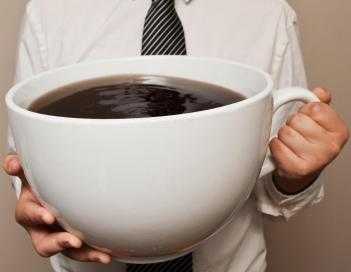MILAN – Can you drink too much coffee? Many of us do not feel human without our daily coffee fix and indeed the energy inducing effects of caffeine can be the difference between surviving and thriving on a daily basis.
Although there are some benefits associated with consuming moderate amounts of caffeine, you can consume too much.
So how do you know if you are drinking too much coffee and what are the signs that you may need to cut back?
Individuals have vastly differing tolerances for caffeine; some people can drink 10 or more coffees each day without any negative side effects, while others are extremely sensitive and are heavily affected by just one or two caffeine-containing substances. For this reason what is too much for one person may not necessarily be the case for others.
For the average person, aiming to keep caffeine consumption below 400-500 milligrams (this equates to one or two barista style coffees each day along with a couple of cups of tea) is considered “safe” and not linked to the unwanted side effects of a racing heart rate, insomnia, restlessness, irritability, dizziness and blurred vision.
The issue for many of us is that extra quantities of caffeine can slip in when large coffee orders can equate to as much as 200-300 mg of caffeine in a single serving.
It is possible, although difficult, to overdose on caffeine, particularly when it is being consumed via drinks as opposed to a concentrated powdered form.
Therefore, on a daily basis, it is important to not focus on overdoing and instead figure out the amount of caffeine you can consume without suffering from negative side effects on sleep and cognitive functioning.
A sign that you may be consuming too much caffeine is if you find that you rely on it to get through the day and experience extreme withdrawal symptoms when you reduce the amount you are having.
Caffeine is a stimulant, which means it affects the central nervous system, increasing heart rate and blood flow.
The immediate effects are increased energy and attention, but the downside is that this stimulatory effect is a short-term benefit only, with energy slumps and fatigue commonly experienced approximately an hour after the caffeine has been ingested.
For those who are sensitive, high levels of caffeine (particularly at night) may also impair your ability to get to sleep or result in a restless sleep.
Generally speaking, we also become increasingly tolerant of caffeine over time. This can explain why once upon a time one cup of coffee was more than enough, whereas now you can easily down three or four.
For this reason, setting a clear limit for yourself that takes into account your personal level of tolerance is the key to not drinking too much, too often.
The secondary issue associated with drinking too much coffee is that in many cases the coffee is adding extra calories and sugar thanks to its milk base and sugar additions. While black coffee and straight espresso contain minimal calories, lattes and cappuccinos are packed full of calories.
In addition, drinking milk-based coffee over extended periods of time also increase the chance that fat will be stored in the liver.
For this reason, for individuals who choose and can tolerate more than one or two coffees each day, black coffee or espresso are the best options.
An excessive consumption of coffee is also likely to mean that you are not drinking enough water.
Dehydration leaves us feeling tired and lethargic and can slow the digestive system leaving us feeling bloated and clogged up. While we can be tempted to reach for more coffee to perk us up, you are likely to benefit from a little less coffee and a lot more water.
The one group of individuals who need to be especially careful of their coffee intake is those with underlying heart conditions.
Caffeine can increase resting heart rate significantly which, when coupled with high-intensity activity, can even be dangerous.
The same can be said for easily influenced adolescents who see the fun in consuming concentrated sources of caffeine via coffee, energy drinks, and even supplements.
This group, who may not be aware of any underlying issues with their heart, need to be particularly careful with consuming excessive amounts of coffee and caffeine and keep their intake well below the upper recommended limits of 400-500 mg per day.
How much caffeine are you drinking? Black coffee 65-120 mg Espresso 30-60 mg Latte or cappuccino 100-120 mg Energy drinks 80-100 mg Tea 10-50 mg.















